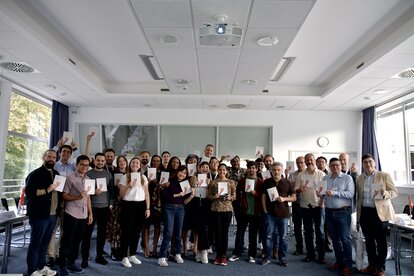IAF Programme
Eyes Wide Open: Discoveries from the Open Society Seminar and Questions for Thai Society
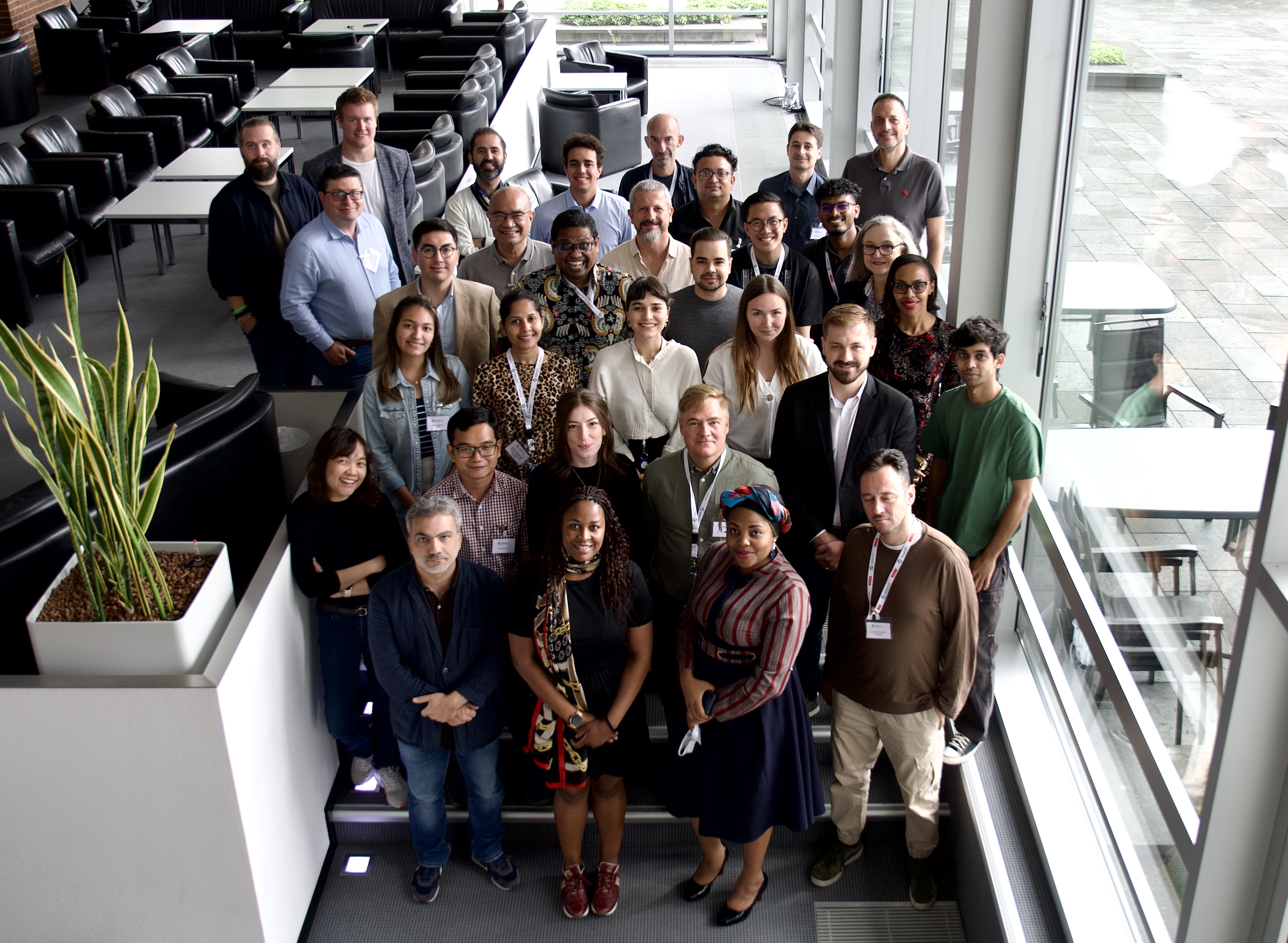
We need to talk openly about open society
The current events unfolding in Thai society and the broader world underscore the diversity of thoughts and opinions that shape our perspectives on various matters. The ideal of a society where individuals can authentically express themselves and be embraced for their uniqueness is a universal aspiration. However, the challenge lies in envisioning and constructing a society where differences can coexist harmoniously. The pertinent question arises: Whose responsibility is it to shape such a society – the entity we term 'the state,' the politicians we designate as our 'representatives,' or is it a collective responsibility?
The concept of an 'open society' emerges as a crucial exploration in addressing these queries. It is grounded in the principles of individual freedom and responsibility, fostering inclusivity and equitable mechanisms for communal living. Yet, discussing 'open society' in the present Thai context may elicit questions like "What is it?" even from ourselves, revealing a potential gap in understanding.
This prompted my involvement in the International Academy for Leadership's (IAF) project aimed at safeguarding Open Societies. In September 2023, Freedom Fighters from over 20 countries convened to explore the essence of open society within the framework of Liberal Democracy. The profound value placed on this concept by many libertarians became a focal point of inquiry.
While this journey yielded numerous answers, it also generated a plethora of questions. These questions beckon us to reevaluate diverse issues, not only within the context of Thai society but on a global scale. As we navigate this path together, let us embark on a collective journey toward the realization of the society we collectively dream of.
It is essential to note that this article captures only a fraction of Ms. Thanisara Rungdej's reflections from this journey and may not encompass all perspectives on open society. It is a topic that we continue to explore and learn about collectively.

Open Society: Answers are in Questions
"Let's grab a piece of paper and a pen, and dive into the realm of our own open society.” Imagine it – what's your first move if faced with this question?
At the Academy, we got together to ponder what comes to mind when we think of open society. We translated those thoughts into visuals, marking the kick-off of our journey into the world of open society in IAF.
Sure, the first week sounds like a 'class' where we dissect the dimensions of open society – politics, economics, and socio-cultural aspects. But it's not a typical classroom setup: talking, group discussions, simulated debates – anything to wrap our heads around those concepts and values that might seem elusive (or that we thought we understood) and give them a spin in different scenarios.
So, here's the pitch – if these are the core values of open society:
- Individual Freedom
- Public Consciousness and Civic Participation (Civic Responsibility)
- Accepting Diversity (Pluralism) and Tolerance
- Rule of Law
- Limited Government
- Free Market Economy
How about some real talk on these topics in the Thai context?
- Should selling organs be legal if we have rights to our bodies?
- Should transgender athletes have the right to compete without restrictions?
- Does a welfare state make people less responsible, relying solely on the government?
- Is Social Sanction a tool for open society, and how do we balance it with individual freedom?
- How much power should politicians and the state have in an open society?
As we rolled through the project at the academy, it's all about hashing out these questions and diving into society's nuances. Sometimes, we're thrown into groups where we champion opinions we might not personally vibe with – a unique challenge.
Obviously, we won't all lock in one answer for each issue. Talking it out lets us see the diverse ideas our classmates bring to the table, coming from different backgrounds. And what's cooler than navigating through these questions is learning to listen, question those opinions, and sometimes revisit our own thoughts – all while maintaining that respectful dialogue. It's like a living simulation of open society right here.
But the real kicker is thinking beyond this journey. How do we, who've been in the open society simulation, carve out space in the society we actually live in?"
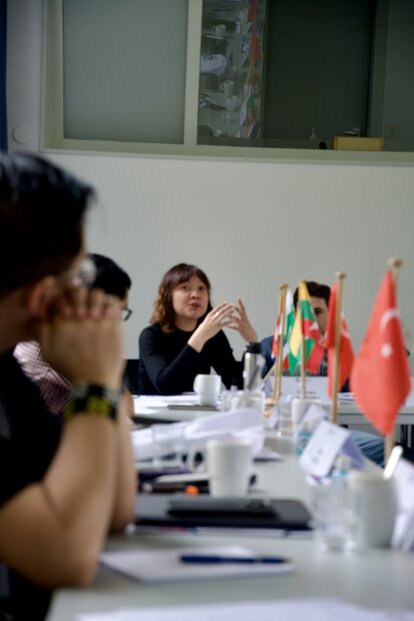
Populism: The Threat to Liberal Democracy
After delving into the concept of an open society, this program raises the alarm, signaling a threat in the very realm we're exploring for answers. Hence, the program's name: Defending the Open Societies.
If an open society values individuals and embraces diversity, the threat appears to be quite the opposite – the devaluation of individualism and the exclusion of differences, encapsulated in the notions of dictatorship and authoritarianism. While that might be the traditional understanding, the enemies of open society have evolved, donning the disguise of 'Populism' or 'Illiberal Democracy' in this era where individual voices are gaining prominence.
Sure, 'Populism' isn't a new term in Thai society, but it's been tossed around in various contexts, leaving many utterly confused. The academy doesn't hand us textbooks; instead, it throws us into the arena, allowing us to experiment with the names we can call the Populist Leaders. We scrutinize them through simulated debates and small group discussions to grasp the characteristics of Populism.
Summing up the learning journey, Populism manifests as follows:
- Rejecting diversity and anti-pluralism, claiming sole representation of the people and knowing their true desires.
- Speaking on behalf of the entire populace and dismissing differing opinions as lacking righteousness.
- Focusing on a single supreme leader over institutions or political ideas.
- Allegedly opposing elites but often becoming the very elites they oppose.
- Utilizing tools like elections to engage people but altering approaches after gaining power.
- Devaluing intermediary institutions, emphasizing direct communication with the public.
- Employing an 'Us against Them' technique for governance, regardless of political spectrum.
Given this checklist, can you think of anyone or anything in Thai society exhibiting these characteristics? Think about political campaigns where the narrative revolves around "If you don't choose us, they'll surely come." Are there 'political fandoms' fostering conformity, economic policies aiming to please without practicality, and institutions sidelining dissenting voices? Is this Populism in Thai society?
Now, why should we be concerned about Populism? It may seem familiar, but the worry lies in its tendency when in power, to foster state exclusion and occupation. It claims legitimacy under the guise of democracy but, in reality, manipulates the power of the people to sow division (polarization) and devalue minority groups with differing perspectives. This can distort the rule of law and undermine intermediary institutions like the media, independent organizations, and civil society, potentially leading us unknowingly back into a closed society under the guise of democracy.
Understanding and analyzing Populism are crucial steps to recognize and address its presence in society. It equips us to engage with and question these discourses without haphazardly labeling everyone and everything.
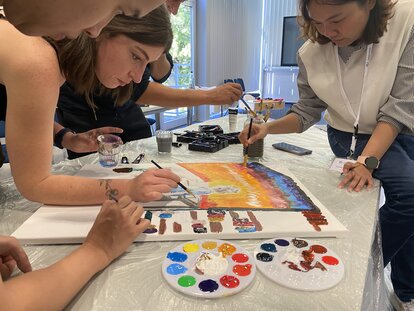
Dresden, Weimar, and Conversations along the way
Beyond the routines of Academy life, the IAF Program offers an invaluable chance for hands-on experiences by taking us to diverse locations. Our journey led us to East Germany, exploring cities like Dresden and Weimar, once encapsulated in the grip of a closed society.
For instance, a visit to the 'Stasi Museum' followed a screening of 'The Lives of Others,' unraveling detailed evidence of the state's intrusive operations during the pre-German unification era. It was a time when individuals' rights and freedoms were tightly controlled, with every conversation and action monitored to safeguard the socialist regime. Witnessing this historical reality was not just eye-opening but also profoundly disheartening. Similarly, our trip to the Buchenwald concentration camp provided a stark reminder of a society that stifles differences and diversity, resulting in dehumanization and injustice based on race, religion, biology, or orientation. The experience heightened our awareness of the peril of regressing toward a closed society – a fate we cannot afford to repeat.
The learning extends beyond these external locations. Traveling together with classmates becomes an opportunity to engage in conversations about topics explored in class, experiences encountered beyond the classroom, global events, or even the day-to-day lives of each individual. These exchanges are an integral part of the journey, reinforcing the realization that our participation in this project is a reminder of the vast differences in the world. There is so much yet to be learned, and countless opinions that we may not have encountered before.
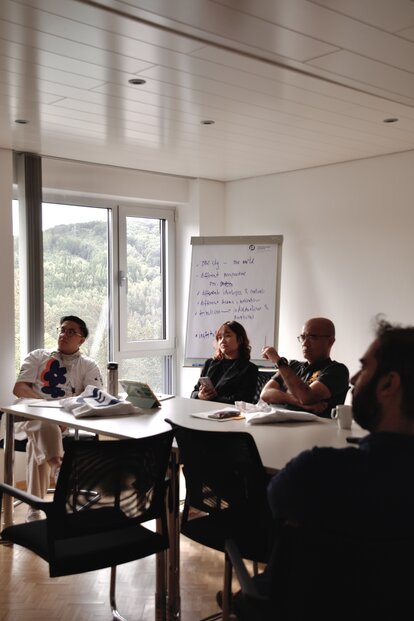
When the door is about to close..
Nobody desires to reside in a society where our thoughts are stifled, and our authenticity is suppressed. The prospect of our differences being treated as grave offenses is equally disheartening. Yet, upon taking a step back and observing the current state of Thai society, it's disconcerting to realize that, perhaps unconsciously, we are heading towards a society that none of us truly desires. Moreover, delving deeper into the global landscape, it becomes apparent that many countries might be treading down a similar path.
This journey, aimed at comprehending the concept of an open society, has strengthened my conviction that it's a realm worth exploring. It appears to be the kind of society that resonates with the aspirations of many. However, let's be frank – crafting such a society is no walk in the park. It demands a cocktail of understanding, curiosity, responsibility, and mutual respect for the freedoms and differences inherent in individuals and institutions.
Yet, just because it's challenging doesn't make it insurmountable. I hold the belief that the assembly of Freedom Fighters embarking on this expedition is committed to navigating a path that, while not easy, is certainly not impossible. Together, we aim to shape the societies we yearn for in every corner of the world. Even though the journey to partake in this program has reached its conclusion, the pursuit continues.
